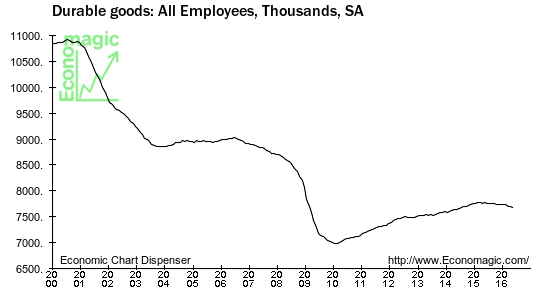The one where Epaminondas (I) agrees with (GULP) CHUCKY SCHUMER?
Yes, you can close your mouths.
Wondering what’s wrong bunky?
A REAL AD FOLLOWS...
Made in China for Less
Meanwhile durable goods manufacturing employment in the USA…

WSJ today:
Schumer Gears Up to Scold China During Hu Visit
Some people are preparing to give Chinese President Hu Jintao a warm welcome when he arrives in Washington this week.
Sen. Chuck Schumer isn’t one of them.
Instead, Mr. Schumer says he wants to use the Chinese leader’s visit to deliver a message: “Both Democrats and Republicans in the Senate and the House, and the American people, are just fed up when, up and down the line, China doesn’t play by the rules and seeks unfair economic advantage.”
The New York Democrat started trying to deliver that message Monday, the eve of the Chinese leader’s arrival in the U.S., when he unveiled the latest version of his legislation to punish China for suppressing the value of its currency. And on Tuesday he’s opening a new front when he uses a visit to a New York optics company to push the Obama administration to call out Beijing for hoarding its reserves of rare-earth metals, making life difficult for a range of manufacturers.
Mr. Schumer has been trying for most of the last decade to promote the message that China doesn’t play by the rules, with mixed success. Yet his renewal and expansion of the effort now points to a basic, underlying reality: The global economic trauma of the last three years has intensified the economic strains between Washington and Beijing, while ensuring that they will be the dominant feature of the global economic landscape for years to come.
The loss of millions of American jobs has increased anxiety about the outsourcing of work to China, while the rise in the budget deficit caused by the crisis has raised fears about relying on China to finance American spending.
Meanwhile, the Federal Reserve’s program of pushing down interest rates to help revive the economy has Beijing complaining that America’s own monetary manipulation is worsening China’s inflation problem. Simultaneously, Europe’s debt crisis figures to keep it bogged down for years, making the U.S.-Chinese competition an even more prominent feature of the international economic landscape.
Above all, the recession has left Americans deeply insecure about their prospects in this long-term economic competition. Indeed, a year ago the Wall Street Journal/NBC News poll found for the first time that Americans were more likely to name China than the U.S. as the nation that would be the world’s leader in 20 years.
Against that backdrop, Mr. Schumer’s message that the Chinese are gaming the international system to their advantage, while hardly new, may have special resonance. In an interview, he argues that the cumulative effect of China’s policies is making a broader range of political players open to his arguments.
“If it were just one area, if they were fine on most things…that would be one thing,” he said. “It seems in almost every place you look, not only do they seek advantage, which every country does, but they seek unfair advantage.”
Read More
- Capital, An Amoral Force Moves, We Congratulate Mr. Obama
Financial Times: Europeans defy US to join China-led development bankFrance, Germany and Italy have all agreed to follow Britain’s lead and join a China-led international development bank, according to European officials, delivering a blow to US efforts...
- And As The Usa Squeezes The Life Out Of Rus And Iran With Oil Supplies Burgeoning … Beijing’s $24 Billion Currency Swap Program To Help Russia Is A Sign Of Things To Come.
Bloomberg: China Steps In as World’s New BankThanks to China, Christine Lagarde of the International Monetary Fund, Jim Yong Kim of the World Bank and Takehiko Nakao of the Asian Development Bank may no longer have much meaningful work to...
-
China floats the idea of selling two-thirds of its US debt China Proposes To Cut Two Thirds Of Its $3 Trillion In USD Holdings. From Will at The Other News: All those who were hoping global stock markets would surge tomorrow based on a ridiculous rumor...
- Obama Sees Advantages In The Decline Of America As An Economic Power
From the Times of India:...The fact of the matter is that for most of my lifetime and I'll turn 50 next year - the US was such an enormously dominant economic power, we were such a large market, our industry, our technology, our manufacturing was...
- When China Quotes Ben Franklin To America, We're In It Deep
And we are. Remember the closed door CIA warning to congress about compromised national sovereignty over debt being held by certain nations overseas? Telegraph UK: The US Federal Reserve's policy of printing money to buy Treasury debt threatens...

